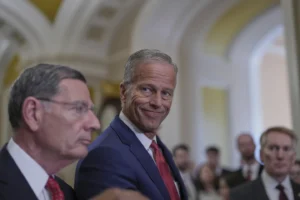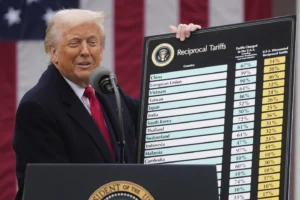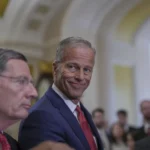State Releases New Guidelines Concerning ‘Explicit’ Books in School Libraries
Superintendent Degenfelder said allegedly-obscene materials have ‘no place in schools’
- Published In: Politics
- Last Updated: Nov 02, 2023
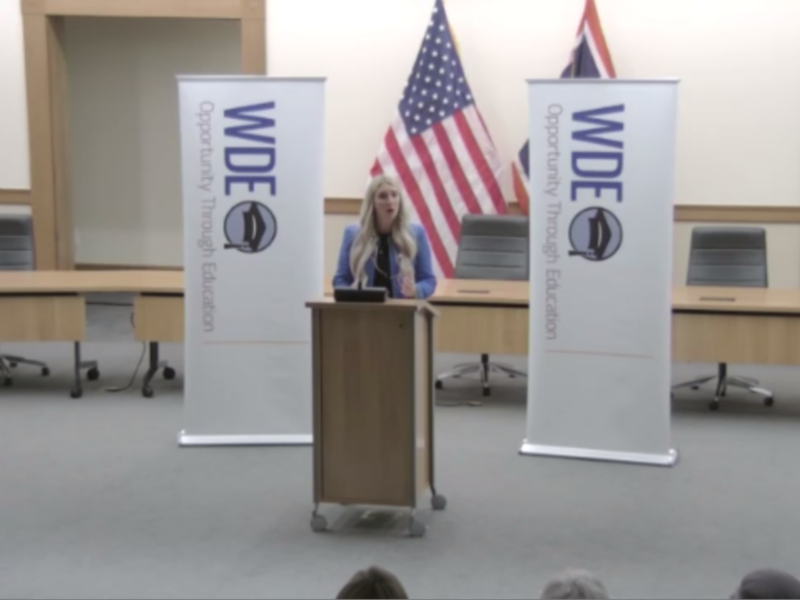
Wyoming Superintendent of Public Instruction Megan Degendelder released on Wednesday the state's new guidelines with recommendations for how school districts should handle allegedly-explicit library books. (Photo via Zoom / Wyoming Dept. of Education)
By Jacob Gardenswartz
Special to the Wyoming Truth
Wyoming Superintendent of Public Instruction Megan Degenfelder on Wednesday introduced new guidelines for K-12 public schools considering developing or modifying their library materials policies, the latest move in an ongoing crackdown on books deemed too “obscene” for students.
“This graphic, sexually arousing material is why parents are upset and concerned,” Degenfelder said in a press conference at the state capitol in Cheyenne. “This type of material has no place in schools, not even one.”
The 13-page guidance document is being shared with schools on an entirely voluntary basis and represents just the first step in her commitment to addressing this issue, Degenfelder said. She noted state leaders will meet with library officials in the coming months to discuss how schools might implement these guidelines in local districts.
The move comes barely two weeks after the Wyoming education leader testified before a U.S. House panel on the issue of school book bans, and as Republican officials throughout the state and the country escalate attacks on books they consider to be unacceptable for children — and on the librarians stocking them on library shelves. In the past year, clashes between community members and public library officials over the appropriateness of allegedly-explicit books have led to controversies statewide, including the firing of Campbell County library director Terri Lesley over her refusal to “weed” out books considered obscene by the library board.
But in her remarks on Wednesday, Degenfelder sought to minimize any potential controversy stemming from the new guidance. She promised local school districts will still maintain control over their library policies and said the guidelines were not meant to enable discrimination based on sexual orientation or gender identity.
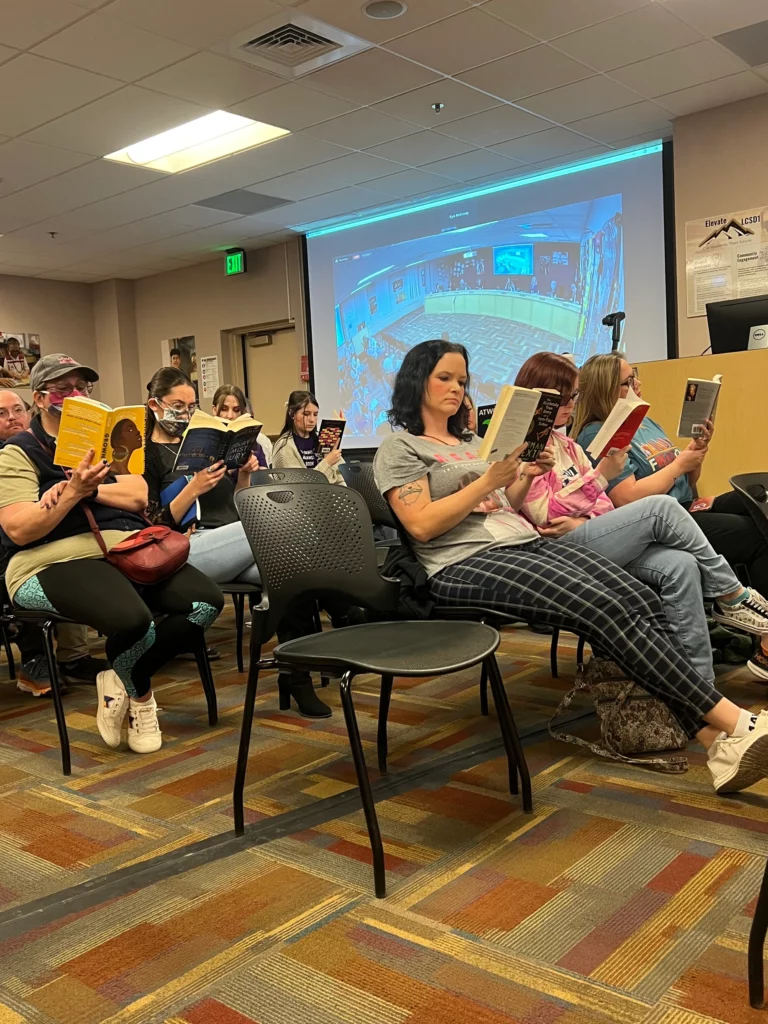
“Nothing in the guidance we have developed bans any book or takes away any local control or forces districts to do anything,” Degenfelder said. “Any book that a local community determines should be removed from a K-12 library as a result of adopting a version of this guidance will still be easily found for purchase in the marketplace or even in some taxpayer [funded] public libraries.”
Pushback abound
Degenfelder’s assurances did little to assuage the concerns of key stakeholders, however.
In a statement to the Wyoming Truth, deputy executive director for the ACLU of Wyoming Libby Skarin pointed to a petition she’s circulating that urges local officials to “protect the First Amendment in Wyoming.” She said her organization is “steadfast in our belief that we do not get to decide what others read – and neither should our elected officials.”
The ACLU of Wyoming “opposes any efforts to censor books that contain ‘sexually explicit content’ or discuss ‘controversial issues’ like race, gender or sexual orientation and will review and continue to advocate for policies that respect the right of all students to read and learn,” Sarkin continued. “Wyoming communities do not need a one-size-fits-all model policy handed down from the state. Each of us gets to choose what books we read and what information we access – but we don’t get to choose for other people or other people’s kids.”
Meanwhile, the Wyoming Education Association (WEA), a group of state educators advocating for student success, was less explicitly critical. In a statement to the Wyoming Truth, WEA president Grady Hutcherson stressed that “Our librarians and educators are professionals who want what’s best for students.”
“Parents and education employees must work together respectfully and never lose sight of our common goal,” Hutcherson continued, “which is to create safe, resource-rich, high-quality learning environments where students can thrive.”
What constitutes ‘explicit’ material?
Degenfelder conceded at the press conference that coming to a clear definition of sexually-explicit materials is “difficult.” The guidance document highlighted language from a draft of a new library materials policy being developed in Laramie County School District #1 (LCSD1), which defines explicit content as materials which “depict sexual conduct or describe sexual conduct using more than a passing reference.”
Yet that exact policy has received significant pushback from some in the community, who, during a school board meeting last month, held a “read in” to urge leaders not to change the existing guidelines. About 30 members of the “Wyoming Family Alliance for Freedom” group read silently from books the likes of Margaret Atwood’s “The Handmaid’s Tale” and Toni Morrison’s “The Bluest Eye” — novels that could face censorship should the new policy be enacted.
Under current standards, LCSD1 and many districts across the state employ an “opt-out policy,” enabling parents to utilize an online portal to disallow their children to engage with any library content they consider inappropriate. As of June, 5,958 LCSD1 parents had registered online, and the district had received just 18 opt-out forms, according to figures shared by district officials.
Some school board members are pushing to change to an “opt-in” program, however, which would identify and automatically remove access to any books deemed “sexually explicit” unless parents proactively enable their kids to read them.
District officials are soliciting public comment on the proposed changes until Nov. 10, and are expected to make a final decision on the matter in early December.
During Wednesday’s hearing, there was little discussion of specific books or materials that were considered to be inappropriate. “If it is so wildly inappropriate for a public press conference, then I ask why we have it available in our schools,” Degenfelder posed.
But Taylor Jacobs, a parent and school board member in Lander who served on the task force developing the new guidelines, brought up one book she found particularly concerning — one she claimed “promoted pornography, discussed sexually explicit material in graphic detail and downplayed the health significance of STDs.”
That text is “Let’s Talk About It” by Erika Moen and Matthew Nolan, a graphic novel which advertises itself as “the teen’s guide to sex, relationships and being a human.”
“This book provided no data or facts, but was simply an opinion piece labeled as sex education resource,” Jacobs suggested, noting students as young as 14 had access to it in the library. With her help, the school board ultimately pushed forward with a new policy making it easier for the district to remove books flagged as explicit.
A review in Publisher’s Weekly notes the novel “provide[s] vital information, embracing the complexity of relationships… and offering comprehensive, no-nonsense information on sex and sexuality.” It recommends the text for children ages 14 and older.





